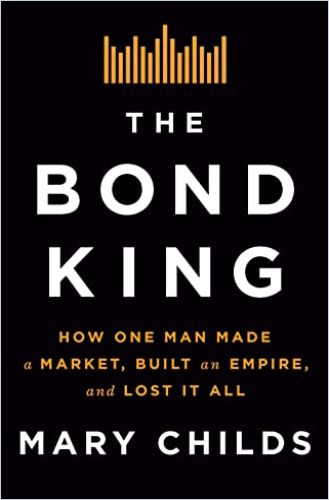Mary Childs — cohost of NPR’s Planet Money podcast — details the vertiginous rise and precipitate fall of Bill Gross, the insightful bond trader who foretold the crash of America’s housing market.

The Bond King’s Rise and Fall
Famously prescient bond trader Bill Gross saw through America’s housing bubble of 2007 and made a fortune. But his later erratic behavior led to his ouster from PIMCO, the giant investment firm that Gross had built. Mary Childs — cohost of NPR’s Planet Money podcast — chronicles Gross’s startling rise and fall.
The Bond King
In 2002, Fortune magazine labeled Bill Gross “the Bond King.” In the finance world, Gross was famous for building a bond firm in Newport Beach, California; practicing yoga; penning folksy Investment Outlooks that gave readers his views on the market; and writing the book, Everything You’ve Heard About Investing Is Wrong! Behind his friendly façade, however, Gross could be mean. He infused his bond company PIMCO with paranoia and pettiness. The company had such a bad reputation for pushing trade counterparties too hard that when a trader or executive left PIMCO, he or she had difficulty finding another job on Wall Street.
Being a bond investor was about seeking safety, calculable certainty.Mary Childs
Gross grew up in Ohio. As a senior at Duke University in 1966, Gross suffered a head-on car collision and was hospitalized for months. To fight the boredom, he studied a book about winning at blackjack. Before a stint in the US Navy, Gross went to Las Vegas to play blackjack. Gross won the $10,000 that financed his MBA at UCLA. Gross later credited his investing prowess to counting cards as a professional gambler. Trading warrants and options, he maintained, wasn’t so different from knowing when to bet against the house and when to hold.
The Bubble
As the housing bubble swelled in 2005 and 2006, Gross sent his credit analysts to various American cities. Their reports confirmed what Gross already knew: Credit was easy, and home price appreciations made no sense. Gross proclaimed in July 2006 that the housing bubble was over. As the mortgage market tanked, the global economy went into a tailspin. By the end of 2007, the PIMCO Total Return fund had generated an unheard-of return of 9.1%. The media churned out favorable coverage; frightened investors poured money into PIMCO.
To many within PIMCO, especially the old guard, this was PIMCO’s value proposition: It pushed clients a little outside their comfort zone, where there were more profits.Mary Childs
PIMCO exploited inefficiencies in the mortgage-backed bonds market. As mortgage rates fell from historical highs, PIMCO realized that mortgage traders were mispricing Ginnie Mae mortgage-backed securities. PIMCO amassed $2 billion in the securities, and Gross locked in massive returns.
Management Style
In 2013, Gross was 69. His Total Return mutual fund had amassed nearly $300 billion in assets, and his personal worth grew to about $2 billion.
Gross was intense, and he could display unhinged behavior. He would go off the rails, pushing one point of view one day and vilifying it the next, leaving everyone baffled and even fearful. Gross displayed a self-promoting selective memory. He’d promise to do something and then, without saying a word, repudiate his promise, leaving everyone else to deal with the fallout.
In February 2014, an extended Wall Street Journal profile divulged what everyone who worked with Gross had known for some time: Gross could be moody, awkward, and insulting. He avoided contact with his employees and insisted on silence on the trading floor, typically a raucous place at other firms. Gross brooked no dissent, and the Journal reported Gross’s sabotage of any PIMCO executives who might succeed him.
In an April 2014 Investment Outlook, Gross wrote about his pet cat staring at him in the shower. In June 2014, Gross delivered the keynote speech at the Morningstar Investment Conference. Gross wore sunglasses and riffed on The Manchurian Candidate, a Cold War movie featuring a Queen of Hearts playing card that triggered a violent response in people who had suffered previous brainwashing. Gross handed out business cards with the Queen of Hearts on the back.
As Gross’s behavior became more erratic, top executives at PIMCO issued an ultimatum: If Gross stayed, they’d leave. Resigned to his imminent firing, Gross called rival bond investor Jeffrey Gundlach, who ran DoubleLine Capital. Gundlach considered joining forces with Gross, figuring that the old bond king was a victim of his own success — and that Gross was managing too much money to be successful. Though Gundlach considered taking on Gross as a fund manager, the talks fizzled. In September 2014, Gross announced his resignation from PIMCO.
Gross Flops
The day Gross disclosed he was leaving PIMCO, investment firm Janus revealed that Gross would manage the Janus Global Unconstrained Bond Fund. The fund had only $13 million under management, a tiny fraction of what Gross had handled at PIMCO. Gross assumed his loyal clients would yank their money out of PIMCO and follow him to Janus. They did not. To get the fund going, Gross moved $700 million of his own money to Janus, and George Soros put in $500 million. After a year, Janus’s fund had only $1.4 billion, half of it Gross’s investment. In 2015, his fund trailed 96% of similar funds. Underscoring the futility, Soros pulled out his remaining $490 million.
The world he’d built was cruel, petty, filled with boys pulling wings off flies — but it had been his. At the end, it had turned its brutality on him.Mary Childs
In 2016, Gross’s wife filed for divorce, hiring a high-profile attorney. The breakup turned ugly, with Gross sending his soon-to-be ex-wife nasty, accusatory emails. After a judge ruled Gross’s wife would get half the couple’s assets, Gross lashed out. Before moving out of their 13,000-square-foot mansion, he took all the remote controls with him and salted the home with dead fish and vomit-scented spray.
A Tragic Saga
Mary Childs knows a genuine saga when she sees one, and this is some saga. In the manner of classic tragedy, the very qualities that propelled Child’s hero — bond genius Bill Gross — to success are the same qualities that later drove him to failure. Childs deals with Gross’s many contradictions maturely: They do not surprise her. She roots many in the extraordinary stress of Gross’s profession. Childs attributes much of Gross’s unbearable behavior to hubris and to the mind-warping aspects of his almost unbelievable success. Childs outlines Gross’s often arcane investing strategies in clear prose that will engage retail investors and market professionals alike.







